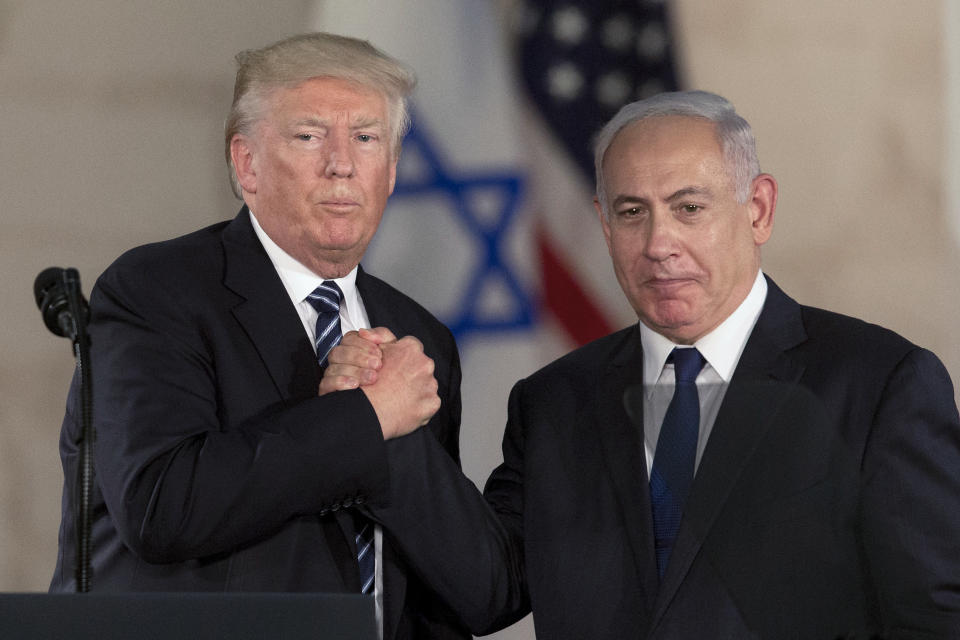Trump likely to put off Israel embassy move — again

Six months after he grudgingly postponed moving the U.S. Embassy in Israel from Tel Aviv to Jerusalem, President Trump seems on track to do so again — breaking a frequent campaign promise that, if kept, risks deeply angering the Muslim world.
Government officials cautioned Yahoo News on Thursday that Trump has not yet revealed his final decision. But, they said, his top foreign policy advisers see no choice but to use his waiver authority under a 1995 U.S. law that requires the United States to move its embassy to Jerusalem but gives presidents the power to delay it in six-month increments. The statutory deadline for Trump to make the decision is Monday.
But the tentative White House plan is to couple the waiver with steps that would signal support for the move in the future, according to those officials. They declined to describe the basket of options under consideration, but the Associated Press reported that Trump could recognize Jerusalem as Israel’s capital — a major shift in U.S. policy, and one that risks inflaming anti-U.S. sentiment among Islamic populations around the world. An informed source told Yahoo News that Trump was considering giving a speech, most likely on Wednesday, to announce that new position.
Vice President Mike Pence said in a speech on Tuesday that Trump “is actively considering when and how to move the American Embassy in Israel from Tel Aviv to Jerusalem.” Pence is due to visit Israel in mid-December and address its parliament, the Knesset.

In practice, Pence was simply reiterating the principles of the 1995 law, which requires the move but gives presidents the leeway to hold off if they certify that doing so is “necessary to protect the national security interests of the United States.” Failure to invoke the waiver would trigger the law’s enforcement mechanism — a 50 percent cut in State Department funding for acquisition and maintenance of facilities overseas until the administration certifies that the embassy in Jerusalem has opened. Officials say that would require the construction of a new embassy because simply relabeling the U.S. consulate in Jerusalem as an embassy is not feasible.
The obstacles to the move are not logistical — they are geopolitical. Israel has claimed Jerusalem as its undivided capital since 1950 and supports moving the U.S. Embassy there. But the Palestinians aim to locate the capital of their potential future state in the eastern part of the city, occupied by Israel since the 1967 war. Moving the embassy would effectively ratify the Israeli claim, risking an angry response from Muslim allies. U.S. policy has been to regard the dispute as one of the “final status” issues to be determined in Middle East peace negotiations. Those diplomatic concerns led Trump’s predecessors to break the same pledge that he made on the stump in 2016.
The Trump administration reportedly plans to unveil its blueprint for a new round of peace talks in late 2017 or early 2018. In a statement accompanying the June 1 waiver, the White House said Trump had made his decision “to maximize the chances of successfully negotiating a deal between Israel and the Palestinians.”
Defense Secretary James Mattis and Secretary of State Rex Tillerson are known not to favor moving the embassy, seeing it as an unnecessary provocation that could inflame anti-American sentiment across the Arab world. Jordan’s King Abdullah II, a crucial U.S. ally, argued against the move during a visit to Washington this week.
Throughout the 2016 campaign, Trump vowed to move the embassy on his first day in office.

In a statement announcing his nomination, David Friedman, the U.S. ambassador to Israel, said he looked forward to working “from the U.S. Embassy in Israel’s eternal capital, Jerusalem.” And just days before his inauguration, Trump responded to a journalist asking him about his pledge by saying, “You know I’m not a person who breaks promises.”
But the sensitivities of the issue are clear on official government websites. The CIA’s World Factbook says this under the entry for Israel’s capital: “Jerusalem: note — while Israel proclaimed Jerusalem as its capital in 1950, the international community does not recognize it as such; the US, like all other countries, maintains its embassy in Tel Aviv-Yafo.” (At the State Department, the page that normally would include such details has carried a “currently being updated” note for most of 2017.)
The embassy issue led to some infamously awkward moments in the Obama White House, including a back-and-forth in which administration spokesman Jay Carney tried to duck the question. And the White House changed a transcript of Obama’s eulogy for the late Israeli President Shimon Peres, striking “Israel” from a dateline that read “Jerusalem.”
Read more from Yahoo News:



